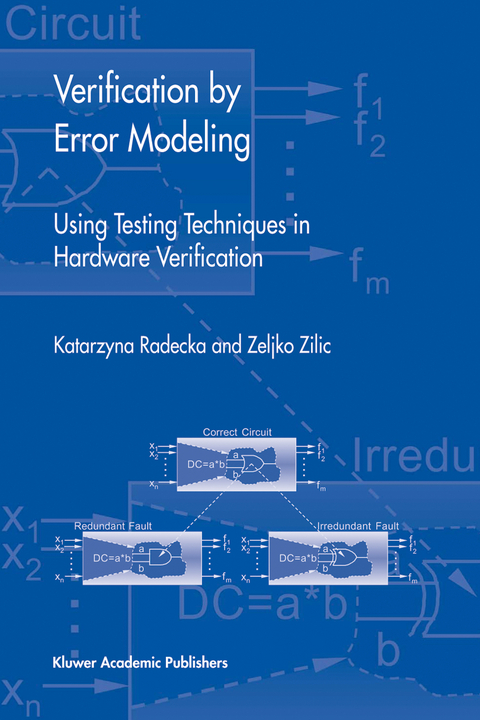
Verification by Error Modeling
Using Testing Techniques in Hardware Verification
Seiten
2010
Springer-Verlag New York Inc.
978-1-4419-5402-2 (ISBN)
Springer-Verlag New York Inc.
978-1-4419-5402-2 (ISBN)
Although there are no widely adhered standards for a design flow, most companies have their own established practices, which they follow closely for in-house design processes. In practice, initial phases of preparing a design specification are susceptible to potential errors, as it is very difficult to grasp all the details in a complex design.
1. DESIGN FLOW Integrated circuit (IC) complexity is steadily increasing. ICs incorporating hundreds of millions of transistors, mega-bit memories, complicated pipelined structures, etc., are now in high demand. For example, Intel Itanium II processor contains more than 200 million transistors, including a 3 MB third level cache. A billion transistor IC was said to be “imminently doable” by Intel fellow J. Crawford at Microprocessor Forum in October 2002 [40]. Obviously, designing such complex circuits poses real challenges to engineers. Certainly, no relief comes from the competitive marketplace, with increasing demands for a very narrow window of time (time-to-market) in engineering a ready product. Therefore, a systematic and well-structured approach to designing ICs is a must. Although there are no widely adhered standards for a design flow, most companies have their own established practices, which they follow closely for in-house design processes. In general, however, a typical product cycle includes few milestones. An idea for a new product starts usually from an - depth market analysis of customer needs. Once a window of opportunity is found, product requirements are carefully specified. Ideally, these parameters would not change during the design process. In practice, initial phases of preparing a design specification are susceptible to potential errors, as it is very difficult to grasp all the details in a complex design.
1. DESIGN FLOW Integrated circuit (IC) complexity is steadily increasing. ICs incorporating hundreds of millions of transistors, mega-bit memories, complicated pipelined structures, etc., are now in high demand. For example, Intel Itanium II processor contains more than 200 million transistors, including a 3 MB third level cache. A billion transistor IC was said to be “imminently doable” by Intel fellow J. Crawford at Microprocessor Forum in October 2002 [40]. Obviously, designing such complex circuits poses real challenges to engineers. Certainly, no relief comes from the competitive marketplace, with increasing demands for a very narrow window of time (time-to-market) in engineering a ready product. Therefore, a systematic and well-structured approach to designing ICs is a must. Although there are no widely adhered standards for a design flow, most companies have their own established practices, which they follow closely for in-house design processes. In general, however, a typical product cycle includes few milestones. An idea for a new product starts usually from an - depth market analysis of customer needs. Once a window of opportunity is found, product requirements are carefully specified. Ideally, these parameters would not change during the design process. In practice, initial phases of preparing a design specification are susceptible to potential errors, as it is very difficult to grasp all the details in a complex design.
Boolean Function Representations.- Don’t Cares and Their Calculation.- Testing.- Design Error Models.- Design Verification by At.- Identifying Redundant Gate and Wire Replacements.- Conclusions and Future Work.
| Erscheint lt. Verlag | 7.12.2010 |
|---|---|
| Reihe/Serie | Frontiers in Electronic Testing ; 25 |
| Zusatzinfo | XV, 216 p. |
| Verlagsort | New York, NY |
| Sprache | englisch |
| Maße | 155 x 235 mm |
| Themenwelt | Mathematik / Informatik ► Informatik ► Software Entwicklung |
| Informatik ► Theorie / Studium ► Künstliche Intelligenz / Robotik | |
| Informatik ► Weitere Themen ► CAD-Programme | |
| Technik ► Elektrotechnik / Energietechnik | |
| Technik ► Maschinenbau | |
| ISBN-10 | 1-4419-5402-3 / 1441954023 |
| ISBN-13 | 978-1-4419-5402-2 / 9781441954022 |
| Zustand | Neuware |
| Haben Sie eine Frage zum Produkt? |
Mehr entdecken
aus dem Bereich
aus dem Bereich
Buch | Softcover (2024)
REDLINE (Verlag)
20,00 €
Eine kurze Geschichte der Informationsnetzwerke von der Steinzeit bis …
Buch | Hardcover (2024)
Penguin (Verlag)
28,00 €


